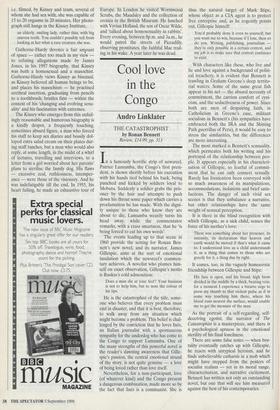Cool love in the Congo
Andro Linklater
THE CATASTROPHIST by Ronan Bennett Review, £14.99, pp. 313 In a famously horrific strip of newsreel, Patrice Lumumba, the Congo's first presi- dent, is shown shortly before his execution with his hands tied behind his back, being punched and kicked by soldiers loyal to Mobutu. Suddenly a soldier grabs the pris- oner by the hair and attempts to push down his throat some paper which carries a proclamation he has made. With the digni- ty unique to those who know they are about to die, Lumumba wearily turns his head away, while the commentator remarks, with a crass smartness, that he 'is being forced to eat his own words'.
The events leading up to that scene in 1960 provide the setting for Ronan Ben- nett's new novel, and its narrator, James Gillespie, aims at the sort of emotional insulation which the newsreel's commen- tary achieves. A novelist who plumes him- self on exact observation, Gillespie's motto is Ruskin's cold admonition:
Does a man die at your feet? Your business is not to help him, but to note the colour of his lips.
He is the catastrophist of the title, some- one who believes that every problem must end in disaster, and that it is best, therefore, to walk away from any situation which might become a problem. This belief is chal- lenged by the conviction that he loves Ines, an Italian journalist with a spontaneous sympathy for the underdog who has come to the Congo to support Lumumba. One of the many strengths of this powerful novel is the reader's dawning awareness that Gille- spie's passion, the central emotional strand of the story, is not quite genuine — a love of being loved rather than love itself.
Nevertheless, for a non-participant, love (of whatever kind) and the Congo present a dangerous combination, made more so by the fact that Ines is a communist. She is thus the natural target of Mark Stipe, whose object as a CIA agent is to protect free enterprise and, as he cogently points out, Gillespie himself:
You'd probably deny it even to yourself, but you want me to win, because if I lose, then so do you. Writing, publishing, journalism they're only possible in a certain context, and my job is to make sure that context continues to exist.
With characters like these, who live and lie and love against a background of politi- cal treachery, it is evident that Bennett is trawling in Graham Greene's deep territo- rial waters. Some of the same great fish appear in his net — the absurd necessity of commitment, the carrion comfort of cyni- cism, and the seductiveness of power. Since both are men of despairing faith, in Catholicism in Greene's case, militant socialism in Bennett's (his sympathies have embraced both the IRA and the Shining Path guerrillas of Peru), it would be easy to stress the similarities, but the differences are more interesting.
The most marked is Bennett's sensuality, which permeates both his writing and his portrayal of the relationship between peo- ple. It appears especially in his characteri- sation of Gillespie, so fearful of commit- ment that he can only connect sexually. Rarely has fornication been conveyed with so much awareness of its manipulations, accommodations, isolations and brief satis- factions. The danger of such vivid sex scenes is that they unbalance a narrative, but other relationships have the same weight of sensual perception.
It is there in the blind recognition with which Gillespie, as a sick child, senses the force of his mother's love: There was something about her presence, its intensity, its declaration that heaven and earth would be moved if that's what it came to. I understood love as a child understands it, as a thing that comes to those who are greedy for it, a thing due by right.
It comes, too, in the vaguely homoerotic friendship between Gillespie and Stipe:
His face is open, and his broad, high brow divided in the middle by a thick, beating vein; for a moment I experience a bizarre urge to press my thumb to that violent pulse as if in some way touching him there, where his blood runs nearest the surface, would enable me to get the measure of the man.
As the portrait of a self-regarding, self- deceiving egotist, the narrator of The Catastrophist is a masterpiece, and there is a psychological aptness in the emotional sterility of his final loneliness.
There are some false notes — when bru- tality eventually catches up with Gillespie, he reacts with untypical heroism, and he finds unbelievable catharsis in a mob which might have stepped from the posters of socialist realism — yet in its moral range, characterisation, and narrative excitement, Bennett has written not only an outstanding novel, but one that will see him measured against the best of his contemporaries.


























































 Previous page
Previous page